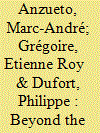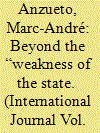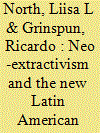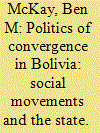|
|
|
Sort Order |
|
|
|
Items / Page
|
|
|
|
|
|
|
| Srl | Item |
| 1 |
ID:
188900


|
|
|
|
|
| Summary/Abstract |
During the 2021 mass protests in Colombia, and while international calls for the Colombian government to respect human rights were intensifying, Canada’s position remained somewhat ambiguous. Part of Canada’s ambiguity can be explained by a simplistic characterization of Colombia as a “weak state.” This article assesses Canada’s bilateral relationship by historizing the development of Colombia’s governance in the key overlapping sectors of security, human rights, and natural resources. From extensive fieldwork, we distinguish two competing rationalities based on the articulation of the notions of “conflict” and “dissent” with the notion of the “rule of law.” We believe that Canada’s bilateral relation with Colombia in the last decades has overlooked the contradictions that exist between democratizing rationalities and antipolitical rationalities. As a result, Canada’s foreign policy has been based on an overly simplistic conception of the relationship between development, security, and the rule of law.
|
|
|
|
|
|
|
|
|
|
|
|
|
|
|
|
| 2 |
ID:
188910


|
|
|
|
|
| Summary/Abstract |
During the 2021 mass protests in Colombia, and while international calls for the Colombian government to respect human rights were intensifying, Canada’s position remained somewhat ambiguous. Part of Canada’s ambiguity can be explained by a simplistic characterization of Colombia as a “weak state.” This article assesses Canada’s bilateral relationship by historizing the development of Colombia’s governance in the key overlapping sectors of security, human rights, and natural resources. From extensive fieldwork, we distinguish two competing rationalities based on the articulation of the notions of “conflict” and “dissent” with the notion of the “rule of law.” We believe that Canada’s bilateral relation with Colombia in the last decades has overlooked the contradictions that exist between democratizing rationalities and antipolitical rationalities. As a result, Canada’s foreign policy has been based on an overly simplistic conception of the relationship between development, security, and the rule of law.
|
|
|
|
|
|
|
|
|
|
|
|
|
|
|
|
| 3 |
ID:
173906


|
|
|
|
|
| Summary/Abstract |
Recent analyses of development and extractivism in Latin America discuss how neoliberal and post-neoliberal strategies under the political economy of resource extraction define the developmental trajectory of national regimes. As most accounts privilege the analysis of structural and historical conditions over everyday practices of state actors, this paper contributes to the discussion by explaining how extractivism and neoliberalism are shaped, reproduced and defended in governmental spaces, defining in this way the development path. On the basis of ethnography of the Peruvian state, in-depth interviews and an analysis of economic, environmental and pro-indigenous policies during 2000–2017, this paper analyses how under the development model of extractivism, governing elites deploy neoliberal or post-neoliberal development strategies and development tools while advancing contradictory development discourses. In this context, states are cynical because, despite progressive regulations and political discourses, everyday actions of governing elites reinforce institutional and ideological constraints on the effectiveness of rights. The promises of pro-indigenous and environmental social reforms are limited from their very formulation because the practices and imaginaries of governing elites are embedded in extractive structures.
|
|
|
|
|
|
|
|
|
|
|
|
|
|
|
|
| 4 |
ID:
190771


|
|
|
|
|
| Summary/Abstract |
Through semi-structured interviews with Senegalese fishermen, this article examines their displacement following the depletion of fishing stocks in Senegalese waters owing to the activities of European and Asian industrial fleets over the last two decades. While there has been some recognition in scholarship that extractivism leads to dire precarity and displacement within local populations, it has not been demonstrated how exploitations at sea are dependent on the displacement of the indigenous people for corporate gains. Thus, this article conceptualizes displacement of local Senegalese fishermen as the product of an active, arguably deliberate process, solely motivated by corporate gains to the detriment of their communal and human life. Furthermore, the article shows that displacement can take on multiple forms such as economic and temporal as well as physical movement. Data is drawn from eighteen semi-structured interviews with fishers from three fishing villages.
|
|
|
|
|
|
|
|
|
|
|
|
|
|
|
|
| 5 |
ID:
146662


|
|
|
|
|
| Summary/Abstract |
What, if anything, is actually new about political and economic transformation in twenty-first century Latin America? Here we explore how ostensibly ‘new’ policies are being built on two ‘old’ foundations that may be mutually exclusive. These are ‘extractivism’ and ‘developmentalism’, concepts that have been used rather loosely to describe current economic policies. The new developmentalism, however, may not only be contradicted by extractivism; it may be more constrained than its predecessor by fortified capitalist class interests and new global conditions. Moreover, it pays little attention to the employment-generating potential of rural areas or to the agricultural sector.
|
|
|
|
|
|
|
|
|
|
|
|
|
|
|
|
| 6 |
ID:
162617


|
|
|
|
|
| Summary/Abstract |
The convergence of social movements in Bolivia was a decisive factor in bringing President Evo Morales and the Movement Towards Socialism (Movimiento al Socialismo, hereafter MAS) to power in 2006. Yet in recent years, this convergence has become fraught with internal tensions as the state’s extractivist development model and promises for plurinationalism and alternative forms of development reveal fundamental contradictions. This paper traces the formation of social movement alliances over time, revealing their power to effect change and their strength when there is unity in diversity. Rather than ‘neoliberalism’ which represented the injustice frame and united identity- and class-based politics during the rise of the MAS, the single greatest threat to the indigenous, peasants, originarios, women and the youth in the current context is extractivism.
|
|
|
|
|
|
|
|
|
|
|
|
|
|
|
|
| 7 |
ID:
158738


|
|
|
|
|
| Summary/Abstract |
Theoretically, this article reveals the long-term risk for local non-governmental organisations (NGOs) of participating in transnational advocacy networks (TANs), accepting money from foreign sources and throwing ‘boomerangs’ internationally—a strategy used by local NGOs to seek international allies to pressure repressive and unresponsive states at home. Focusing primarily on the suppression of environmental NGOs that oppose natural-resource extraction, this article examines three cases—Russia, India and Australia—to illuminate the consequences of this trend for local civil society and TANs. It also documents a global trend towards states depicting local NGOs with international linkages as subversive agents of foreign interests, justifying legal crackdowns and the severing of foreign funding and ties. State framing of NGOs as agents of foreign interests is repressing local environmental activism, depoliticising civil society and weakening international NGO alliances—a conclusion with far-reaching consequences for the future of TANs, local NGOs and environmental activism.
|
|
|
|
|
|
|
|
|
|
|
|
|
|
|
|
|
|
|
|
|